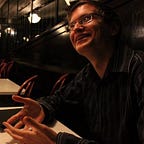Lizard Poisons Spock
Notes from “Rock Breaks Scissors” by William Poundstone
Tips for beating the odds, gleaned from Rock Breaks Scissors: A Practical Guide to Outguessing and Outwitting Everybody by William Poundstone.
Underlying Theory: We are bad at generating true randomness, and our non-randomness can often be predicted. Here are some tips for predicting how others will fail to effectively randomize their actions, along with some tips for more effectively randomizing our own actions. Using these tips, we can often outguess our opponents and have a better-than-random chance of winning an otherwise random game. For full explanations of each tip, read the book.
- Rock, Paper, Scissors: «1» Scissors is least popular (35/35/30), and men favor rock, so pick paper in a one-shot match. «2» Announce your throw and go through with it (most opponents will figure you won’t). «3» Naïve players don’t like to repeat the same throw more than twice in a row (i.e., if they play rock-rock, play scissors next). «4» If all else fails, make it 2 out of 3.
- Multiple Choice Tests: «1» On true-false tests, true is more common (56%). «2» On 4-choice tests, B is most common (28%). On 5-choice tests, E is most common (23%). «3» An “all” or “none” answer is almost twice as likely to be correct. «4» The correct answer for the previous question is less likely to be correct for this one. «5» Longer, more specific answers are more likely to be correct, while answers that are outliers are less likely to be correct. «6» If all else fails, make your best intuitive guess.
- Tennis, Football, Baseball: «1» On the defensive, expect actions (serves, plays, pitches) to alternate between the options (left vs. right, running vs. passing, type of pitch). If it was left, expect right; if it was running, expect passing; expect a different kind of pitch each time. This is particularly true if the previous action failed, or was already repeated twice in a row. «2» On the offensive, truly randomize your actions using a watch or heart-rate monitor (i.e., “if left side of clock, then …”, or “if final digit odd, then …”).
- Soccer Penalty Kicks: «1» If your team is winning, kick to the right. In this situation, the keeper will dive to the left (his right) 71% of the time. «2» If it’s tied, or you’re losing, it’s a toss-up.
- Card Games: «1» As in the cases before, a player who bluffs this time is less likely to bluff next time. «2» Truly randomize your own bluffing using a watch or a formula based on the cards you have, without making it a tell (i.e., if using your watch, look at your watch every time, not just when your hand is weak). «3» Pupils expand when we get what we want, contract when we don’t. Use this to your advantage (watch for it), but don’t let it be used against you (wear sunglasses).
- The Lottery: Nothing can improve your odds of winning, which remain vanishingly small. No matter what, a lottery ticket is a bad investment (unless the intrinsic satisfaction you get from playing and losing justifies the cost by itself). If you want to reduce your chances of sharing a jackpot, however, you can pick from these relatively underplayed numbers: 10, 20, 29, 30, 32, 38, 39, 40, 41, 42, 48, 49, 50, 51, 52, 58, 59. Pick from this list at random, avoid patterns, and avoid numbers prevalent in the media. (Statistical Side Note: Asked to choose a number between 1 and 10, or 0 and 9, 28% will choose the number 7.)
- Passwords: «1» Note that four passwords—password, 123456, 12345678, and qwerty—open 1% of all accounts. Similarly, 1234 accounts for 11% of PINs, followed by 1111 (6%), and 0000 (2%). «2» For your password, generate a list of truly random passwords. Pick one that you can remember by converting it into a memorable phrase. [Or use the xkcd method.] Similarly, pick a truly random PIN, and non-obvious security questions.
These are just a few of the most interesting and useful tips from the book.
For more on outguessing, including strategies to increase your chance of winning office basketball, football, or Oscar pools, and ways to stay ahead of the housing and stock markets, read Rock Breaks Scissors: A Practical Guide to Outguessing and Outwitting Everybody by William Poundstone.
Note: The title of this article refers to “Rock, Paper, Scissors, Lizard, Spock,” an adaptation of “Rock, Paper, Scissors,” invented by Sam Kass and Karen Bryla, and popularized by The Big Bang Theory. I haven’t found any statistics about the relative frequency of throws in this game, but if you’re playing against Sheldon Cooper, assume he’ll play Spock.
